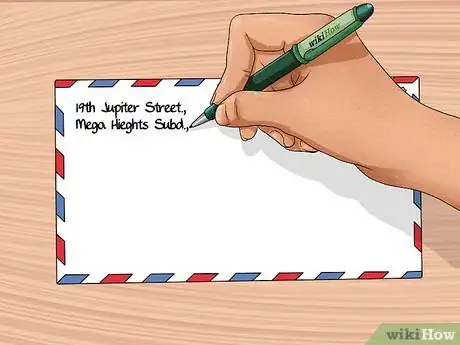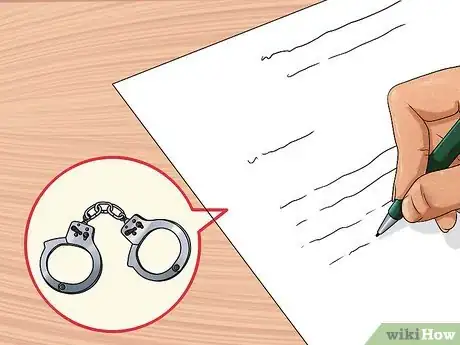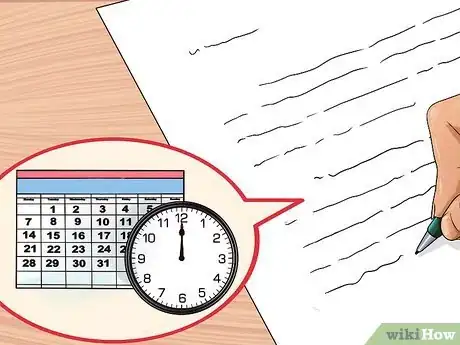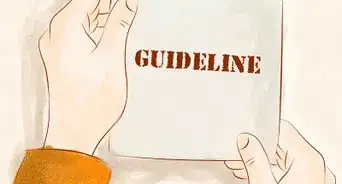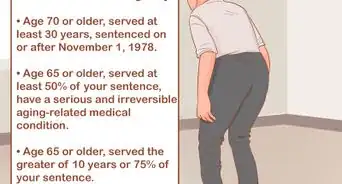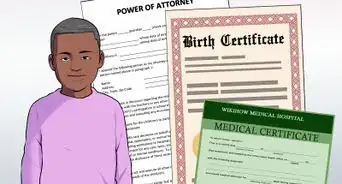X
This article was co-authored by Clinton M. Sandvick, JD, PhD. Clinton M. Sandvick worked as a civil litigator in California for over 7 years. He received his JD from the University of Wisconsin-Madison in 1998 and his PhD in American History from the University of Oregon in 2013.
This article has been viewed 78,500 times.
Did, all of a sudden, your luck turn on you? Do things seem to be pretty tough for the next while or so? You may have a great job, a great family, but you are being sent to jail. Are you concerned about how to inform your employer about this horrible news, or whether to do it at all? Well, sometimes you just have to "bite the bullet", and face things as they come.
Steps
Part 1
Part 1 of 5:
Preparing to Talk to Your Boss
-
1Gather all of the information about your jail sentence. Talk to your defense attorney who represented you in your trial to be sure you know what dates you will be in jail. You also need to know what charge you are being held for. Whether you are being held pending bail or trial or to serve a sentence after conviction is also pertinent.
-
2Decide if you need to disclose the sentence. Obviously you will need to tell your boss if you will be missing work or if you are required by company rules or a contract. If you are able to structure your jail time so that you do not miss work, you may not be required to tell your employer. Even if you aren’t required to disclose your sentence, you may want to if your boss is likely to find out about it through other channels, though.[1]Advertisement
-
3Ask about a leave of absence. Some companies offer a leave of absence without pay for up to three months at the discretion of the employer. If you are a valued employee, your offense does not otherwise impact your job, and your jail term is not long, your boss may consider allowing you a leave of absence for the period of your incarceration. [2]
-
4Consider how many vacation days you have accrued. If you have accrued vacation days, you may be able to use them to offset some of the time you will be incarcerated.
Advertisement
Part 2
Part 2 of 5:
Telling in Person
-
1Set an appointment with your boss when there are not likely to be any distractions. This could be early or late in the day, but generally is not in the middle of the work day. Ask for a meeting to discuss an important personal issue that will impact your work.
-
2Consider asking a trusted third person to attend this meeting with you. Frequently, having a third person there may help you remember things and keep the meeting from getting overly emotional.
-
3Get to the point. When you meet with your boss, don’t beat around the bush. Let them know what is going on and how it will (or won’t) impact your job.[3]
- Tell your boss you are sorry, but that you will be going to jail.
- Tell your boss the reason you will be going to jail if you hope to keep your job. Keep in mind that criminal records are public, and your boss will be able to find out the reason through other channels.
- Tell your boss the dates you will be in jail.
-
4Ask about retaining your job. Ask your boss if you can take a leave of absence, extended vacation, or preserve your job in some other way. If not, ask if you will be allowed to reapply for your job or a similar job once you are released.
Advertisement
Part 3
Part 3 of 5:
Telling in Writing
-
1Write a letter or email if you are unable to tell your boss in person. It is best to do this in person. Some situations make that impossible, however, such as:
- Your boss in not in the same location as you.
- Your boss is on vacation.
- You are incarcerated without prior notice.
-
2Format your communication as a formal communication. Do not use slang or abbreviations. If a letter, include a return address and formal address block.
-
3Get to the point. In the body of your written communication, don’t beat around the bush. Let them know what is going on and how it will (or won’t) impact your job. Your first paragraph should:[4]
- Tell your boss you are sorry, but that you will be going to jail.
- Tell your boss the reason you will be going to jail if you hope to keep your job. Keep in mind that criminal records are public, and your boss will be able to find out the reason through other channels.
- Tell your boss the dates you will be in jail.
-
4Ask about retaining to your job. In the second paragraph, tell your boss you would like to take a leave of absence, extended vacation, or preserve your job in some other way. Let them know that you understand if that cannot be arranged, but let them know you would like to reapply for your job or a similar job once you are released if necessary.
-
5Ask a trusted person to deliver your letter if possible. If time is of the essence and you will be missing work, you will not want to wait for a regular mail service to get the letter to your boss.
Advertisement
Part 4
Part 4 of 5:
Telling Through a Third Person
-
1Ask a third person to talk to your boss if you are unable to tell your boss in person or in writing. It is best to do this in person. Some situations make that impossible, however, such as:
- Your boss in not in the same location as you.
- Your boss is on vacation.
- You are incarcerated without prior notice.
-
2Locate a trusted person. The person who communicates for you should be someone you trust and who you believe will present the information in a professional manner. This could be:
- Your attorney
- Your spouse
- A trusted co-worker
- A trusted friend or relative
-
3Give this person all of the necessary information. Be sure this person knows all of the information necessary and how to properly inform your boss. They will need to tell your boss what is going on and how it will (or won’t) impact your job. They should:[5]
- Tell your boss you are sorry, but that you will be or are going to jail.
- Tell your boss the reason you will be going to jail if you hope to keep your job. Keep in mind that criminal records are public, and your boss will be able to find out the reason through other channels.
- Tell your boss the dates you will be in jail.
-
4Ask about retaining to your job. Your messenger should tell your boss you would like to take a leave of absence, extended vacation, or preserve your job in some other way. Let them know that you understand if that cannot be arranged, but let them know you would like to reapply for your job or a similar job once you are released if necessary.
Advertisement
Part 5
Part 5 of 5:
Dealing With the Aftermath
-
1Be prepared to lose your job. In most cases, an employer can fire you for missing work because of incarceration. In fact, in most cases, you can be fired from your job for any reason so long as it is not a prohibited reason, such as discrimination. [6]
-
2Take advantage of programs offered while in jail. Many jails have education and job training programs to help you gain employment once you are released.
-
3Accept any help from your parole officer or rehabilitation services when you get out of jail. They may be able to help you apply for your old job or one similar to it.
Advertisement
Warnings
- Chances are, you're going to be let go. Very few employers are sympathetic to this kind of situation. On job applications, one of the questions which are usually asked, if you have a previous criminal conviction.⧼thumbs_response⧽
Advertisement
References
- ↑ http://www.bizfilings.com/toolkit/sbg/office-hr/managing-the-workplace/handling-employees-arrest-or-incarceration.aspx
- ↑ http://humanresources.about.com/od/glossaryl/g/leave_absence.htm
- ↑ http://articles.baltimoresun.com/2003-10-19/business/0310180172_1_employer-jail-time-dui
- ↑ http://articles.baltimoresun.com/2003-10-19/business/0310180172_1_employer-jail-time-dui
- ↑ http://articles.baltimoresun.com/2003-10-19/business/0310180172_1_employer-jail-time-dui
- ↑ http://www.bizfilings.com/toolkit/sbg/office-hr/managing-the-workplace/handling-employees-arrest-or-incarceration.aspx
About This Article
Advertisement









